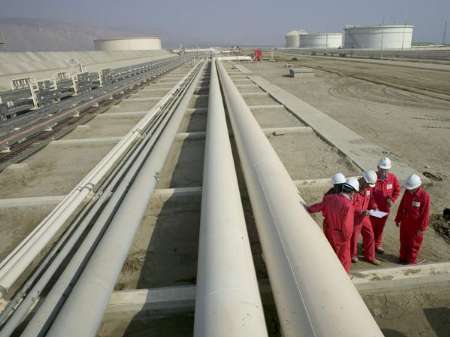ID :
329114
Mon, 05/19/2014 - 09:01
Auther :
Shortlink :
https://oananews.org//node/329114
The shortlink copeid
Three Scenarios For Exporting Iran’s Natural Gas To Europe

Tehran, May 19, IRNA – Iran is not competing with Russia for gas sales in Europe and is therefore after cracking a win-win deal for presence in European markets through one of three possible paths, Ali Majedi, deputy oil minister for international affairs said on Sunday.
[Three scenarios for exporting Iran’s natural gas to Europe]
“Turkey is one of the most important paths for Iran in a bid to have presence in European markets, and we have even reached certain agreements with that country for transiting and transferring Iranian gas to Europe,” said Majedi in an interview with Mehr News Agency.
Speaking about Iran’s 2nd scenario for exporting natural gas to Europe the Iranian deputy oil minister referred to the Iran-Iraq-Syria-Lebanon-Mediterranean Sea path.
“The third scenario is exporting the Iranian natural gas to Europe through the Armenia-Georgia-Black Sea path,” he said.
The official referred to the European countries’ limitations for importing natural gas from Russia, or LNG from the green continent, reiterating,” All said, Turkey is the most economic path for transiting gas to the European countries.”
“After completion of the sixth trans-Iranian gas pipeline the capacity of Iran’s gas exports to Turkey will be doubled,” Majedi said, referring to the required infrastructure facilities for boosting gas exports through Turkey.
One more time rejecting any kind of competition with Russia on gas sales to Europe after the emergence of the Ukraine crisis, the deputy oil minister said that Iran has long term plans for gas exports to Europe.
Speaking about the win-win aspect of the deal, he said that keeping in mind that Iran has the largest natural gas resources in the world, this country is capable of providing gas for the European countries in the long run.
Meanwhile, Azizollah Ramezani, the managing director of the National Iranian Gas Company (NIGC), too, referring to the beginning of negotiations with four European Union (EU) member countries for Iranian natural gas exports through Turkey, as one of the possible paths for gas exports to the green continent, said that Iran’s gas exports to Iraq, too, will begin this year.
Officials in Iran have recently said that Tehran is working on plans to increase its exports of natural gas to Europe in the near future.
The Iranian Oil Minister, Bijan Namdar Zanganeh, recently asserted that European countries were looking to diversify when it came to meeting their energy needs.
This diversification could, according to Ali Majedi, the Iranian Deputy Minister of Oil for International Affairs and Trading, take the form of increased natural gas exports from Iran to the European market, with a daily volume of anywhere between 4 and 50 million cubic meters. The route that this energy would take on its way to the European market is undetermined as of yet, although Majedi has said that Turkey provides the most “economical” route for the delivery of natural gas to Europe.
This planned increase in natural gas exports on the part of Iran comes in the context of serious tensions between the European community and Russia.
Russia, which supplies approximately 30 percent of all European gas, has threatened to cut off gas shipments if the Ukraine refuses to pay its gas debts.
This warning, delivered in a statement by Alexander Novak, the Russian Energy Minister, is significant because a sudden halt in the supply of gas from Russia would undoubtedly result in a great deal of economic dislocation until alternate sources of gas could be secured.
Iran, which holds the world’s largest discovered natural gas reserves, seems like the perfect fit for a European market suddenly uncertain of its supplier, but the political dimensions make this a much more complex problem.
Iran’s plans to increase its exports of gas to Europe have been interpreted by some observers as a political statement on the part of Iran, despite the best efforts of Iranian officials to convince the world otherwise.
Zanganeh recently said that the politicization of the energy industry endangered the security of the global energy market, and that the energy market should be allowed to function independently of sanctions and politics. This comment can be seen as referring not only to the Ukraine Crisis, but also to Iran’s struggle to increase its oil production within the limits of OPEC.
This drive on the part of Iran to increase its production of oil and natural gas has been characterized by the attempt to attract investment, both domestically and from abroad.
This investment is particularly needed in the South Pars gas field, an enormous field of natural gas shared between Iran and Qatar. Any investment into this massive field could easily result in a large increase in production, and in economic stimulation for Iran.
However, this desired increase in production necessitates an increase in foreign markets, an increase which has been partially satisfied by South Korea.
South Korea has recently doubled its imports of crude oil from the Islamic Republic of Iran, importing 552,884 tons in April alone. This increase, although undoubtedly significant in its own right, is perhaps even more important as an indicator of the general trend displayed by Iran, which is to find new foreign markets to which it can export its natural resources.
When seen in this context, Iran’s plans to increase its natural gas exports to Europe take on an even greater significance./end





